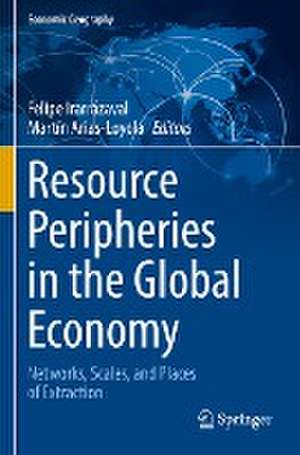Resource Peripheries in the Global Economy: Networks, Scales, and Places of Extraction: Economic Geography
Editat de Felipe Irarrázaval, Martín Arias-Loyolaen Limba Engleză Paperback – 13 oct 2022
| Toate formatele și edițiile | Preț | Express |
|---|---|---|
| Paperback (1) | 693.25 lei 6-8 săpt. | |
| Springer International Publishing – 13 oct 2022 | 693.25 lei 6-8 săpt. | |
| Hardback (1) | 699.45 lei 6-8 săpt. | |
| Springer International Publishing – 12 oct 2021 | 699.45 lei 6-8 săpt. |
Preț: 693.25 lei
Preț vechi: 815.59 lei
-15% Nou
Puncte Express: 1040
Preț estimativ în valută:
132.67€ • 144.06$ • 111.44£
132.67€ • 144.06$ • 111.44£
Carte tipărită la comandă
Livrare economică 22 aprilie-06 mai
Preluare comenzi: 021 569.72.76
Specificații
ISBN-13: 9783030846084
ISBN-10: 3030846083
Pagini: 213
Ilustrații: VIII, 213 p. 11 illus., 6 illus. in color.
Dimensiuni: 155 x 235 mm
Greutate: 0.32 kg
Ediția:1st ed. 2021
Editura: Springer International Publishing
Colecția Springer
Seria Economic Geography
Locul publicării:Cham, Switzerland
ISBN-10: 3030846083
Pagini: 213
Ilustrații: VIII, 213 p. 11 illus., 6 illus. in color.
Dimensiuni: 155 x 235 mm
Greutate: 0.32 kg
Ediția:1st ed. 2021
Editura: Springer International Publishing
Colecția Springer
Seria Economic Geography
Locul publicării:Cham, Switzerland
Cuprins
1. Introduction: Resource peripheries in the global economy.- 2. Commodity Chains and Extractive Peripheries: Coal and Development.- 3. Disarticulations in Resource Peripheries: Bolivia’s Oil and Gas Supply Industry.- 4. From resource peripheries to emerging markets: Reconfiguring positionalities in global production networks.- 5. Scale as a lens to understand resource economies in the global periphery.- 6. Reproducing the resource periphery: Resource regionalism in the European Union.- 7. From the ‘pampas’ to China: scale and space in the South American soybean complex.- 8. Space, scale and the global oil assemblage: commodity frontiers in resource peripheries.- 9. Scalar implications of circular economy initiatives in resource peripheries, the case of the salmon industry in Chile.- 10. No worker´s land. The decline of labour embeddedness in resource peripheries.
Notă biografică
Felipe Irarrazaval is a postdoctoral researcher and adjunct professor at the Instituto de Estudios Urbanos y Territoriales at the Pontificia Universidad Católica de Chile and at the Center for the Study of Conflicts and Social Cohesion (COES). He received a Ph.D. in Human Geography from The University of Manchester. His research examines resource governance, particularly extractive industries in Latin America, through the lens of global production networks, political geography, and urban studies. He has undertaken research in Peru, Bolivia and Chile, and has published his research in journals like Economic Geography, Political Geography, Annals of AAG, Capitalism Nature and Socialism, and EURE.
Martín Arias-Loyola has a PhD in Economic Geography and Planning Studies at the Bartlett School of Planning, University College London. He is Assistant Professor at the Departamento de Economía, Universidad Católica del Norte; Associate Researcher at IDEAR (Regional Institute for Applied Economics) and at ORDHUM (Regional Observatory for Human Development); and Postdoctoral Researcher/Visiting Academic at the Faculty of Architecture, Building and Planning, University of Melbourne. His research interests are variegated and include the study of power asymmetries; the dark side of economic and political geography; (neo)extractivism; extractive industries; neoliberalism; grassroot movements and political resistance; the political role of academia; and cooperative modes of production in informal settlements, to promote self-sufficiency, camaraderie, and economic/political autonomy.
Martín Arias-Loyola has a PhD in Economic Geography and Planning Studies at the Bartlett School of Planning, University College London. He is Assistant Professor at the Departamento de Economía, Universidad Católica del Norte; Associate Researcher at IDEAR (Regional Institute for Applied Economics) and at ORDHUM (Regional Observatory for Human Development); and Postdoctoral Researcher/Visiting Academic at the Faculty of Architecture, Building and Planning, University of Melbourne. His research interests are variegated and include the study of power asymmetries; the dark side of economic and political geography; (neo)extractivism; extractive industries; neoliberalism; grassroot movements and political resistance; the political role of academia; and cooperative modes of production in informal settlements, to promote self-sufficiency, camaraderie, and economic/political autonomy.
Textul de pe ultima copertă
This book discusses the conditions that underpin configuration of specific places as resource peripheries and the consequences that such a socio-spatial formation involves for those places. The book thereby provides an interdisciplinary approach underpinned by economic geography, political ecology, resource geography, development studies and political geography. It also discusses the different technological, political and economic changes that make the ongoing production of resource peripheries a distinctive socio-spatial formation under the global economy. Through a global and interdisciplinary perspective that uncovers ongoing political processes, socio-economic changes and socio-ecological dynamics at resource peripheries, this book argues that it is critical to take a more profound appraisal about the socio-spatial processes behind the contemporary way in which capitalism is appropriating and transforming nature.
Caracteristici
Discusses different technological, political and economic changes Helps to understand how local areas get marginalised of global economy Provides an analysis of global extractive industry and its implications














